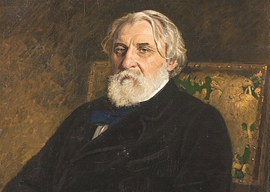
July 07, 2018

Turgenev by Repin
Turgenev died just under two months later, without having received a reply from Tolstoy; I don’t think anyone could read it without recognizing the nobility of him who wrote it.
Recently I reread Turgenev’s beautiful lecture, later published as an essay, “Hamlet and Don Quixote.” In this essay, Turgenev says that these two figures are at the opposite poles of human character or soul. “We have to recognize,” he says, “a fundamental law of all human life: this life is nothing other than an eternal reconciliation and struggle between two principles constantly separating and constantly reuniting.” The first is that of Hamlet, reflecting skeptically on himself and the world to the point of paralysis, and the second is that of Don Quixote, who, sure of his mission, acts without hesitation but mistakes everything around him. Both tendencies, unmodified by the other, lead to disaster. Hamlet’s indecision leads ultimately to the death of everyone about him; Don Quixote’s rescue of a little boy being beaten by his father only leads to a much worse beating when the Don withdraws.
Turgenev implies by his analysis that there is no perfect solution to the problems of human existence, that neither constant reflection nor impulsive action will solve them, and that an unstable equilibrium between action and reflection is the best we can hope to achieve. We need just the right quantity of doubt, but we rarely have it.
Comments on this article can be sent to the .(JavaScript must be enabled to view this email address) and must be accompanied by your full name, city and state. By sending us your comment you are agreeing to have it appear on Taki’s Magazine.